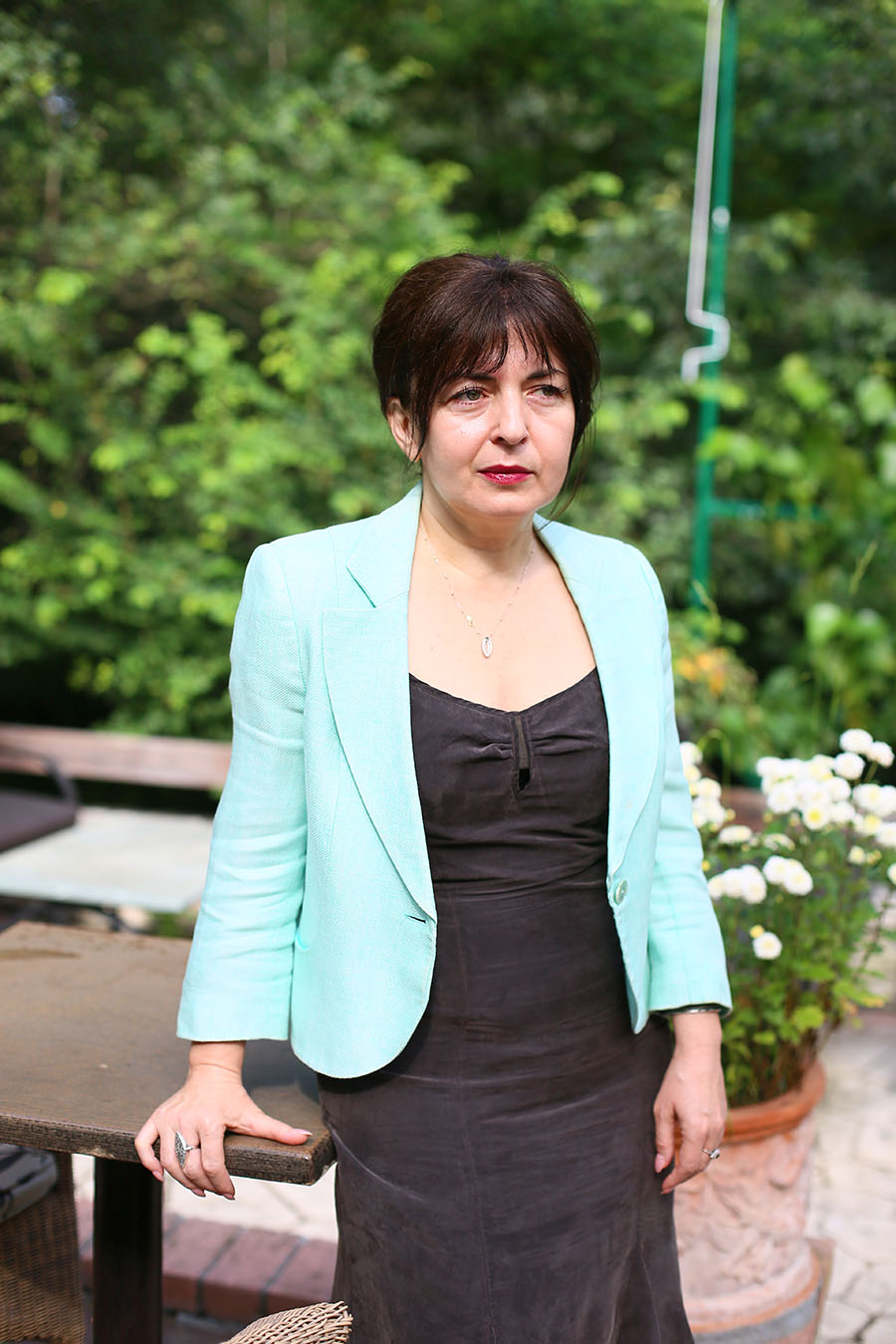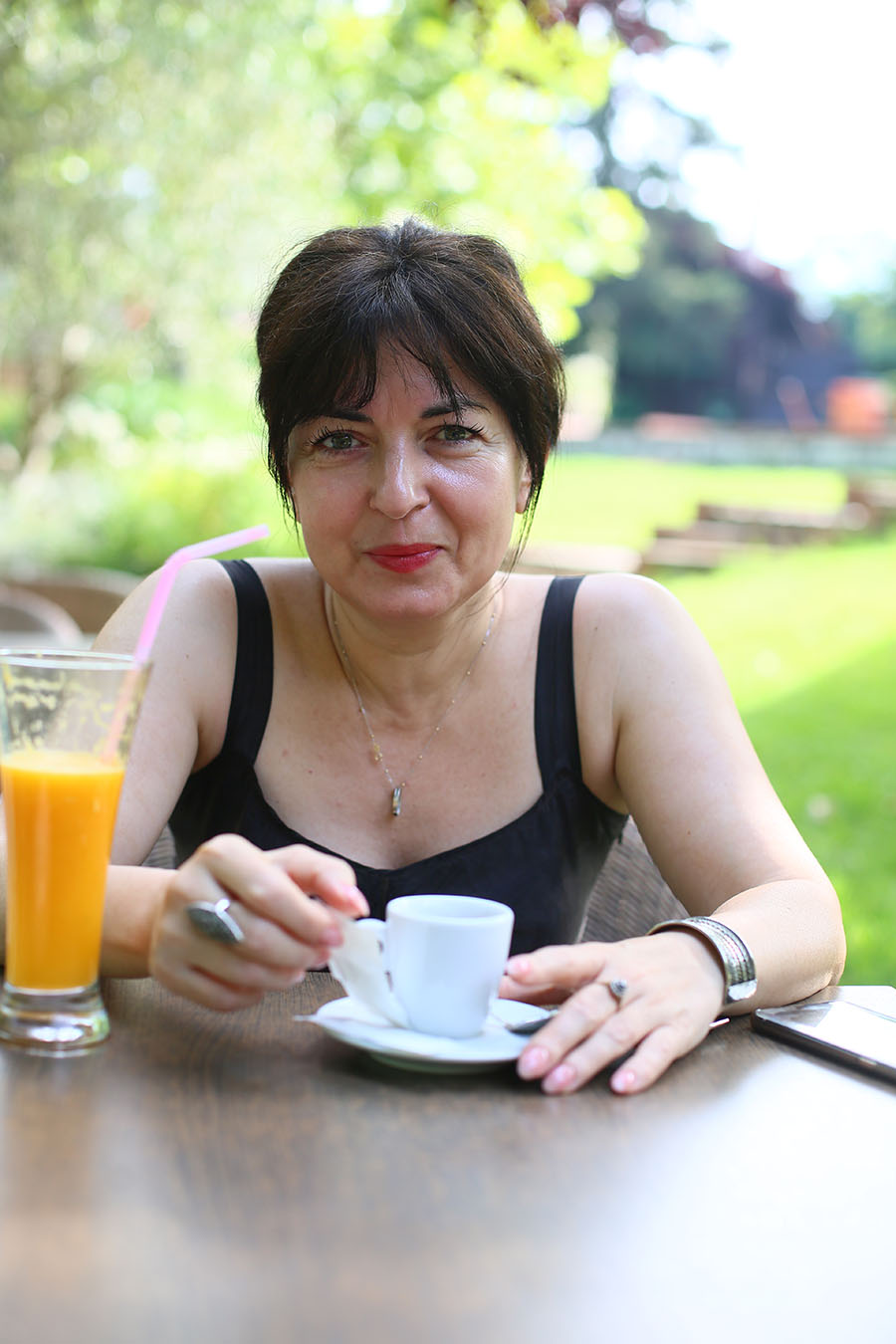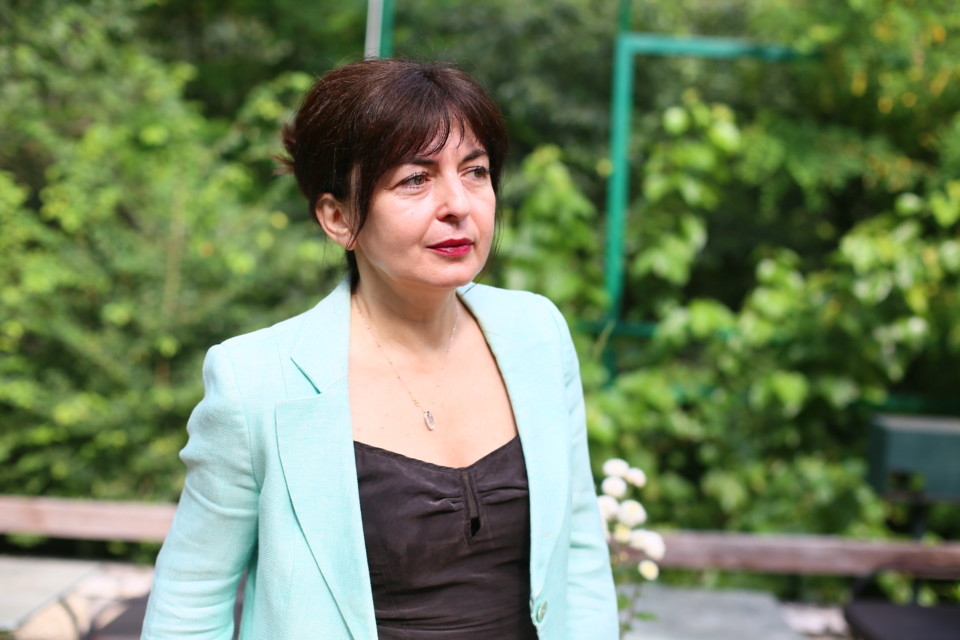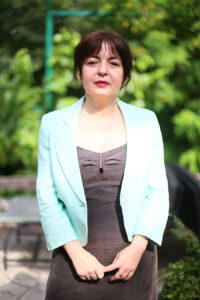M A J A
Tirana | 2019
M A J A
City — Tirana
Age — 51
Love life — Single
Profession — Financial and Management Consultant (freelance)
Years in Tirana — All her life, besides some years abroad
Location — Prince Park
T H E T I R A N A S T O R I E S
‘YES, THINGS
ARE BAD,
WELCOME TO
THE WORLD’

- What is your best personality trait? “Best is confining, because what is best in a certain situation could also be challenging in a different situation. But what makes Maja me is genuine, I’m very me. It’s a combination of things—whatever you inherit, your personality, the way you were brought up. A strong thing at home was facing difficult issues and voicing them, not suppressing them or saying sugary things to please the other. We had discussions and you were praised for disagreeing. It was an everyday thing, because my childhood and youth were during the socialist years. So you had a reality that was very politicized and repressing and very much framed. And then you have a life of your own, the things you really believe in set apart from the propaganda in books and media. The message at home was, the best treasure you can have in your life is to be you and not to be afraid to be you. Develop resilience so you can say no to ethical issues that go beyond your values. You don’t lie to save your ass, you protect the weak, you take a stand. Those values are very strong for me. This raises you to be grounded rather than fragile—when you’re fragile you need your dose of sugar-coating every day and all the world needs to be nice to you. But you’re not entitled to a beautiful world of crystal. No—you have to face reality.”
- What makes you different than other people? “I definitely don’t see myself as a mainstream female character, but I can’t say I haven’t seen part of me in, or a resemblance with other women. I don’t categorise myself, but I feel much a connection with women who have a strong philosophy of life and a good sense of themselves. An open-mindedness to certain values and to not fitting in a box. You question yourself every day and you see beyond whatever bullshit propaganda the world tells you. You criticise and cross-check facts and you’re never 1000% sure. That way you relate to people who have a willingness to question things and see the beauty in the ugliness. This is probably what makes me special, wherever I go. I’m always glad to meet soulmates—anyone who has more of a citizen-of-the-world attitude, that’s not just about your present residence or how often you travelled in the last ten years—you can be an expat and still be close-minded. It’s more about what you did with that experience, how that changed you. Did you gain a broader mind, how open is your soul? And do you distance yourself gracefully from the mainstream, or do you accept your fate and stick with people who are different from you? In my philosophy of life I’m for independence and against victimization. One of the things I dislike is either objectifying or saying you have to be kind. No—you have to grow up and be tough. Yes, things are bad, welcome to the world. I’m more rightist in that perspective because of this independence. Do your own thing, don’t depend on the others or the government, know what you want and go for it. Don’t come up with an excuse for your failures. You just didn’t try or you lost and gave up, or you glorify the ‘but I’m female’ strategy or whatever, I don’t buy it. I also don’t feel this whole #metoo movement. I’m too strong a personality. As a man you wouldn’t try to do that with me, because you won’t get to that point for me to say no. I send a message of ‘don’t you even think about it’. I totally disagree with retaliation, it takes two to tango. But the fact that it’s talked about in the open, is a good thing. I’m aware that not all the women in the world are strong like me and have and the ability to protect themselves under whatever circumstances. If you talk about uneducated girls and women who have kids and can’t get a job and have to put up with violent or abusive bullshit, yes, they have my full support, they don’t have a choice.”
- What is your biggest life lesson? “Free yourself from fixed ideas. Thirty years ago my perception of a tower was what I had seen in Vienna by then, a building of 30 storeys. But when I went to study in Phoenix and wanted to see the tower there, it was just a ground floor building that was called the tower. Can you imagine? That is why I get almost appalled at people saying: he is a good man, he is a bad man. What do you mean? Define ‘good’ for me. Good under what circumstances? From whose point of view? Good for whom? I don’t even dare to define good and bad. It’s always a matter of extent. One of the quotes that has echoed with me through the years has been ‘how big is the power of the weak’—there are so many ways you can interpret it. In the film this quote is from, it was an expression referring to the people who victimize themselves and how they manipulate you by asking for mercy. But you can make it motivating in a good way—how can you empower the weak and make them aware that they don’t know how much strength and power is within them, other than feeling doomed and stuck in the pit.
And then another life lesson is: the road to hell was paved by good questions. I do agree philosophically with the request of the left wing for good questions for the good people. The thing is, where do you stop, because by human nature people always ask for more. The question that is never raised is, what are they willing to offer? No one talks about what do they need to do in order to get what they want. And who is giving it to them? God? Some crazy guys who work 20 hours a day, like me and a few others? It’s a matter of extent, that’s why I can’t define myself. I tend to be rightist, but of course I don’t want basic poverty around me, because it’s distressing. Where is the limit? It comes down to this equilibrium. It’s the drive to do good for yourself and the world, not just the entitlement that ruins whatever capacity you have because you won’t go out to do things.”

- What is your biggest disappointment? “Because of my early years in a socialist society I was a strong believer in capitalism. In my family we believed there is a good capitalism out there. The disappointment was me facing that my concept of good capitalism was naïve. The capitalism I admired is about fairness, venture and an entrepreneurial spirit, with accountability for your actions to the community. About producing something meaningful that makes life better for people and develops societies. And then you come down to earth. Since ‘92 I’ve worked abroad in management positions at international banks or financial institutions. At the beginning I was disappointed when someone was doing unethical things, and asking or pushing you to be a part of it. For example, you are in a credit committee and you have to approve a bad loan of someone else’s superior, for whatever personal or political interest. I’ve said no and experienced repercussions. The first time I was still so naïve to think, it’s the fault of this particular person, not of the system; because the system had good foundations in my belief. And then you have one experience after another and you see it’s the whole system that nourishes this kind of corruption, because of greed. Right in the middle of the financial crisis I was struggling with it and I felt alone in this and that was not a good feeling. So I quit twice, from a bank and financial institution, both international. I was manager of the first and CEO in the second case. I was hoping to make a change, but then you just find the whole structure against you. I do still believe in capitalism, but not the way it is now, not the free enterprise where you automatically have the monopoly to rip people off and render shitty service. The world is in a crisis of finding a better model, and I don’t know if we are lucky enough in my lifetime to find it. It’s beyond us, there are forces and powers in the dark who are affecting the direction of history.
But the real urgent issue is poverty, allocation of resources. Who decides how transparent it is? Is it going to get worse before it gets better? This is part of the disillusion of people in Albania. They fought and were so excited about democracy, but of course they had no culture to back up democracy. Democracy is freedom, but freedom doesn’t mean, ‘give me, I’m entitled’ but ‘you’re accountable for your fucking life, do your homework and be serious about it when you vote or sign a commitment or contract’. Albanian society as a whole is not mature enough to face this. This is why our transition probably is amongst the worst among former communist countries. We are in a dirty transition period in which things in many aspects are getting worse. Which is very bad and demotivating, because who to trust? Politicians promise people the stars and they just vote for them. And this is the real crisis, the quality of education and the integrity of the crowd, how easy they bite the hook of those powers. That’s sad. Leftist, rightist, centrist, they’re all alike. It becomes so socially acceptable that people don’t know they’re being poisoned, it gets into their skin. We’re living in George Orwell’s 1984.” - What advice would you give other women in Europe? “Think for yourself. Not all good things come in a beautiful wrapping and not all that glitters is gold. So don’t give up critical thinking. I see a lot of double standards. If the guy from my tribe or wing does something wrong, then you justify him, ‘he did it for the good cause’. But if the guy from the other wing or race or whatever did something small, you crucify him. So look at things in a more relative way and compartmentalise. See what it relates to, not just who said it, see the whole message and how valid it is. Many discussions get lost in those details and we are missing the core issue that could get us forward together. Nothing comes in a full package. Try the other side. Associate. Get together and listen to the enemy. So much may get lost in translation.
Another example of how idealistic fodder impacts our thinking: in communist Albania we always listened in secret to the Voice of America. It was the window to the rest of the world that we were forcefully isolated from. When I went to the States in ’95, I had studied their language, culture and literature for years, I had worked with Americans and I had socialized with them, and I felt I was very ready and prepared. You are so arrogant in your young days, you think you know everything. So there I go. And my first visit in New York, oh gosh. I was petrified. I saw the most orthodox and fanatic Marxist/Leninists in fucking New York. To me it was a shock, because this was the country of good capitalism. Of the free-minded spirits. And it was like I was in Berlin. I thought, no this is not America. Well, of course, it was not America as per my definition. We always get biased, however open we are.”
- What is the best advice someone ever gave you?
“It was something a very dear colleague and very special person said to me, right before he turned 75. When you’re stuck together for a month somewhere in Nigeria, there is so much room to get in-depth. Getting back from Nigeria, we had 12 hours waiting time in Istanbul. He gave me this Ethno Jazz that he knows I would love, but at some point it’s boring when you’re stuck in a chair, however VIP that hall is. He noticed my lack of energy and spark, which is usually there. He was sitting at a distance from me and he came close, put his hand on my shoulder and said: ‘You’ve got to love life, kid, because death sucks.’ And he passed away five days after that. He was a great, great person. He had so much work to do and so much love to give, he left his mark on so many people. The fact that he just couldn’t accept seeing the light turning off in me and the intensity with which he said that… It’s really a life message, like, ‘Live every second, whatever way, but colourfully. Don’t just be there, don’t just breathe and exist, do it.’ I get goose bumps each time I think of this moment.” - What is the best thing that ever happened to you? “Meeting colourful people and people who surprised me out of all my judgmental frames. That’s the best, best lesson you can get. I was studying Spanish as second language in Costa Rica. I wanted to be on my own, away from the mainstream crowd who went to Mexico, and I wanted to get the local feel of the culture. And I had my fair adventures in the jungle and the rain forest, and it was scary, back in 1995-96. But the most wonderful thing was – and this is what I really love – feeling how much you relate to people who are geographically so distant from you. These people are enlightening, and sometimes they give you one of the most striking lessons against prejudice in life, but you won’t know until you meet them and talk with them. So go to a different continent, to a culture which is totally different from yours, live there for three months, turn off your fucking phone, don’t read or watch your media—just jump in that thing. You come back a different person, because you question all your beliefs.”
- What is your biggest insecurity? “If I’m doing the right thing for people that I love. It’s the biggest dilemma. It’s bigger than things for my own life. Failing my beloved is my biggest fear. I’m afraid my decisions might hurt them. I had this dilemma when my son, who is now 27, was in primary school. I was wondering if should take him to a private school. And then you do your due diligence. Study the details, cross-check them, go and see for yourself, sneak in, speak to sources, do anything. At some point I stepped back and asked myself: why is this the best? Wouldn’t it be better if he were in a class with 30 regular kids rather than five kids in an elite school? Is he going to get better educated at this perfect, safe private school, or will he end up more resilient and down-to-earth at a normal school, because he’ll be facing more real-life challenges? In the end, he went to a private school, but he didn’t like it and went back to the public school after two years.
I also had to make a decision about my sister. Her being sick in the hospital and me having to decide what would be the best treatment for her. Should I keep her at that hospital or take her to a hospital in another country? These are life-and-death decisions you are taking for someone else… You don’t… I don’t… that’s the worst. It’s just the fact that you carry such a burden. You can carry the mountain if it’s for you. But when you have to take decisions for people who are vulnerable, that is the darkest thing. It’s life-changing. Then you realize there are so many dimensions to what’s right. You don’t have the key. So you accept you are so weak and know nothing.
Another question mark or dilemma would be in my attitude of being very pro-active from staying out of harm’s way, away from things I don’t like. Being very selective and astute has served me well, as a profligacy, fending off unwanted events, people, whatever. My question mark is, have I missed beautiful opportunities, beautiful people, potential love because of it?” - What does your city mean to you? “It’s my hometown, it’s where I grew up. What aches is no longer finding your identity, your past in the traces of the city. The corner where you had your first kiss is gone, the bench where you used to sit on with friends after school is gone. It’s a very emotional thing. It’s your city, but it’s not your city. I’m also missing the people of my generation. The people you went to school with, grew up with, shared those days together with, they are not here anymore. It’s the memory tree that you’re missing, and it hurts. I’m losing my childhood, my younger days, anything healthy. And that’s a pain I share with all of my generation. It’s like the quality of air that you breathe here. Every day, little by little, it’s shrinking. All this greed, all that stupid construction in the city, it’s so strong and very undemocratic and very much mafia-oriented. I’m not against construction, but don’t do it downtown, preserve at least a quarter, leave at least some traces of how it used to be 50 years ago. All the tall buildings are only being erected in this square kilometre downtown because there it costs as much as if you’re living in New York or Paris. Quality of life is much worse there and these buildings don’t make economic sense. This is what hurts. Tirana losing its identity. It might not have been beautiful, but it was peculiar when you could see the Ottoman history, whatever was left of early Tirana. After the Communist Regime historical parts of town were destroyed, but at least the roads made sense, there were more community spaces and more green areas. Whereas now, you have to walk to the artificial lake to find some green. The city is suffocating me. There is definitely a lot of energy here nowadays, but it’s toxic energy. Yes, with my education, experience and set of skills, I could have been elsewhere, but I’ve decided to be here long term because of very close ties that I have. I’ve made those compromises for the people I love, so I’m very much at peace with it. The sacrifices I’ve made have never undermined the core of me. I can travel for business or for pleasure, I’m independent. Because living here, you need to get away, you need to get some oxygen, get into nature. We’ve ruined the natural order of things.”
Photos by Bora Dervishi


